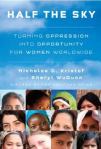I realize I haven’t blogged here in quite some time, and I really don’t want to turn this into a book review blog. Having said that, I’ve been reading voraciously and it’s difficult to not just write about it. I’ve recently finished reading Half the Sky by Nicholas Kristof (and his wife Sheryl WuDunn) and Letters to a Diminished Church by Dorothy Sayers. I’m currently in the middle of The Death of Adam by Marilynne Robinson. While I wouldn’t say these books in and of themselves have anything in common, there is something about each of them that struck me while I was brushing my teeth. Each book is written by an author you would normally expect to be of the opposite sex from what they actually are.
Let me unpack that a little bit. Marilynne Robinson is already known for her outstanding achievement in writing sensitively from a man’s perspective in her novel Gilead. So perhaps it shouldn’t come as a surprise that she grapples with the heady issues surrounding philosophy, science, Darwinism, modernism, culture and Calvinism with verve and wit in The Death of Adam. Sayers was one of the Inklings, a group of men (save Sayers), including Lewis and Tolkien, writing in the mid-20th century who met regularly to discuss literature. Sayers writes with authority on matters regarding the church’s move away from sound doctrine and society’s devaluing of good work, among other things. Of course, both Robinson and Sayers are known well for their fiction writing which is top-notch, but in their non-fiction writing they are not afraid to move beyond the expected “women’s issues” that so many
man’s perspective in her novel Gilead. So perhaps it shouldn’t come as a surprise that she grapples with the heady issues surrounding philosophy, science, Darwinism, modernism, culture and Calvinism with verve and wit in The Death of Adam. Sayers was one of the Inklings, a group of men (save Sayers), including Lewis and Tolkien, writing in the mid-20th century who met regularly to discuss literature. Sayers writes with authority on matters regarding the church’s move away from sound doctrine and society’s devaluing of good work, among other things. Of course, both Robinson and Sayers are known well for their fiction writing which is top-notch, but in their non-fiction writing they are not afraid to move beyond the expected “women’s issues” that so many  Christian female (and also feminist!) writers feel they must write about. They also aren’t afraid to address the traditionally male areas of philosophy and science. And I am so grateful they weren’t, because we can inherit both their example and their work as a result.
Christian female (and also feminist!) writers feel they must write about. They also aren’t afraid to address the traditionally male areas of philosophy and science. And I am so grateful they weren’t, because we can inherit both their example and their work as a result.
Kristof, in his New York Times columns, has long been known for upholding the cause of women in the developing world. He takes it to a new level in Half the Sky, a vibrant, hopeful book which makes the case that the best way to lift the 2/3 world out of poverty is to help and educate women. In light of this, he is very careful to point out that he doesn’t think this is a “women’s issue” but in fact a general human rights issue that affects everyone, women and men. It is refreshing to read a book by a man that is so dignifying to women, and I credit him for it. In the process, however, he doesn’t bash men or preach at them, barking at them to take more responsibility, but makes his cause one in which everyone has a role to play, and points to both male and female heroes in his story. 
I would urge you to read all of these authors, not just because they are excellent writers, but because they are challenging the stereotypes of what women and men are “supposed” to write about. They show that anyone can be part of any conversation that society is having, as long as they have something worthwhile to say.
(For those of you who think that I am going a little heavy on the non-fiction, don’t worry, I’ve been reading plenty of fiction as well.)